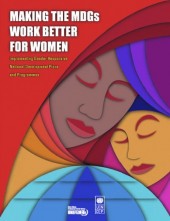Making the MDGs Work Better for Women
It is now recognized that sustainable human development cannot be achieved without gender equality. Achieving the Millennium Development Goals (MDGs) by 2015 hinges on making tangible progress with regard to gender equality and women's empowerment, not only as a goal in itself (MDG3), but also in the achievement of all the other goals. When women are integrated meaningfully into the labour force, there are impressive advances in social well-being. When women are empowered, there are better health and education outcomes for their children as well as a more sustainable use of natural resources.
Maintaining and scaling up investments in gender equality is especially important in the context of the current global economic crisis. Projections of sharply reduced economic growth, rising unemployment, tightening credit conditions, falling remittances, and compressed aid flows will likely deepen deprivation around the world and seriously impede, if not reverse, progress towards the attainment of the MDGs, including MDG3. In this context, it is especially important to optimize the use of scarce aid funds and protect and scale up recent achievements towards the attainment of gender equality.
This publication provides knowledge on successful practices and approaches that governments, donors and civil society can take to make the MDGs work better for women. It reviews the successes and challenges faced in meeting MDG targets and the extent to which national reports have addressed gender in reporting on each goal. It concludes with a set of key recommendations for advancing progress towards achieving gender equality.






